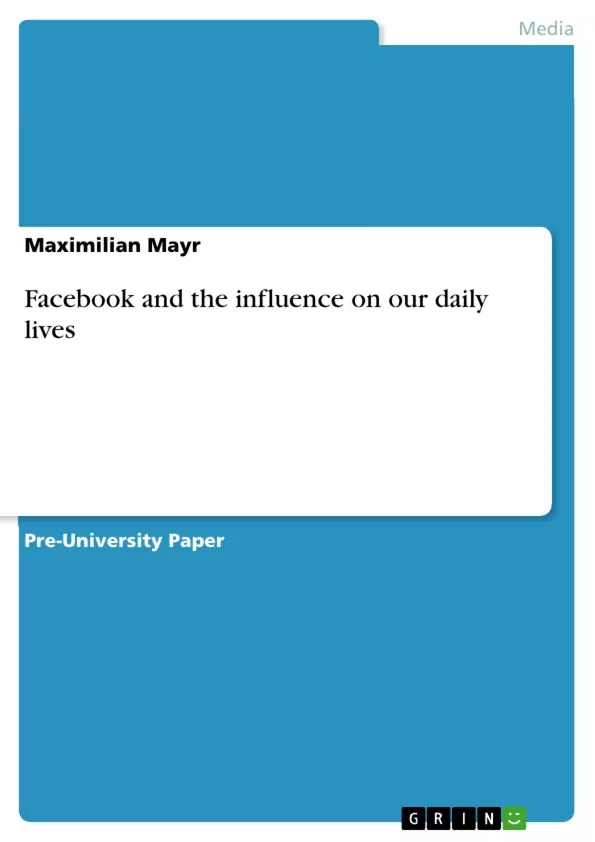After writing this “Facharbeit”, I can proudly say that I am much more informed about Facebook and how it influences our daily lives. From now on I know very much about Mark Zuckerberg and the history of Facebook as a company. Mark Zuckerberg is a very interested and talented person with a good sense of modern trends. He has founded Facebook for the right reasons, and I think he is only that successful because he always was more interested in satisfying users than making money with his projects.
Facebook is the most successful social networking site, and although Facebook involves some dangers like cyber attacks or becoming addicted to Facebook, I fortunately can say that no one of them concerned me up to now. For the future I am well informed about how I can use Facebook safely and efficiently, so I have nothing to fear from.
Due to the great possibilities Facebook offers to government agencies, politicians and companies, it has developed to one of the most important and useful Internet platforms worldwide. Government agencies and politicians have a new platform to disseminate information and to advertise for themselves. Concerning these new possibilities, nowadays government agencies and politicians are able to confront more target groups with politics and important news than they could without this platform. Companies are enabled to make personalised advertising, so they are able to maximize their profits.
Furthermore Facebook and other social media proved their importance nowadays, when we look at what have happened in Egypt. The revolution in Egypt, initiated by groups of demonstrators who has communicated and organized their plans via Facebook, probably would never had occurred without the capabilities Facebook offers.
Table of Contents
- Introduction
- An overview of Facebook
- Reasons why Mark Zuckerberg founded Facebook
- Reasons for the great success of Facebook based on differences to other social networks
- Dangers of Facebook
- Loss of privacy
- Cyber crime
- The effects of being dependent on Facebook
- Benefits of Facebook
- Benefits for commercial users
- Benefits for regular users
- Potential uses of Facebook by government agencies and politicians
- The increasingly important role of Facebook in politics
- Further examples of how different government agencies make use of Facebook
- How Facebook has changed Egypt
- The development of "The 6th of April Youth Movement"
- The effects of the 6th of April Youth Movement on Egyptian politics
- Conclusion
Objectives and Key Themes
This paper aims to explore the various aspects of Facebook, including its origins, reasons for its success, potential dangers, and benefits. The paper also analyzes the influence of Facebook on political discourse, focusing on the case of Egypt.
- The rise of Facebook as a global social network
- The impact of Facebook on social interactions and communication
- The potential dangers and benefits of Facebook for individuals and society
- The role of Facebook in political movements and activism
- The influence of Facebook on the Arab Spring, specifically in Egypt
Chapter Summaries
- The introduction outlines the author's interest in social media and Facebook specifically, highlighting the need to understand its impact and potential.
- Chapter 2 provides an overview of Facebook, describing its origins, growth, and key features, including the user interface, functionalities, and privacy settings.
- Chapter 3 explores Mark Zuckerberg's motivations for creating Facebook, emphasizing his vision of a more open and connected world rather than a pursuit of financial gain.
- Chapter 4 examines the factors contributing to Facebook's success, highlighting its user-friendly design, privacy features, and the effectiveness of its News Feed function.
- Chapter 5 addresses potential dangers associated with Facebook, including loss of privacy, cybercrime, and the negative effects of excessive dependence.
- Chapter 6 discusses the various benefits of Facebook, both for commercial users and ordinary individuals, highlighting its role in fostering connections, promoting business opportunities, and facilitating information sharing.
- Chapter 7 explores the potential uses of Facebook by government agencies and politicians, emphasizing its growing importance in political communication and engagement.
- Chapter 8 analyzes the transformative role of Facebook in Egypt, examining the development of "The 6th of April Youth Movement" and its impact on Egyptian politics.
Keywords
This paper focuses on the social and political influence of Facebook, exploring key concepts such as social networks, privacy concerns, political activism, communication technology, and the Arab Spring. The study examines the evolution of Facebook, its features, and its impact on various aspects of modern life.
Frequently Asked Questions
Who founded Facebook and why?
Facebook was founded by Mark Zuckerberg with the aim of creating a more open and connected world, prioritizing user satisfaction over immediate financial gain.
What are the main dangers associated with using Facebook?
The primary dangers include loss of privacy, cybercrime (such as identity theft), and the potential for users to become addicted or dependent on the platform.
How do politicians and government agencies use Facebook?
They use it as a platform to disseminate information, engage with target groups, and advertise their political goals and news directly to the public.
What role did Facebook play in the Egyptian revolution?
Facebook was instrumental in organizing and communicating plans for demonstrators, specifically through groups like "The 6th of April Youth Movement," which significantly influenced Egyptian politics.
How does Facebook benefit commercial users?
Companies can create personalized advertising and target specific demographics, allowing them to maximize their profits and reach new markets.
Why is Facebook more successful than other social networks?
Its success is attributed to its user-friendly design, innovative features like the News Feed, and its ability to adapt to modern trends faster than its competitors.
- Quote paper
- Maximilian Mayr (Author), 2011, Facebook and the influence on our daily lives, Munich, GRIN Verlag, https://www.grin.com/document/465452



